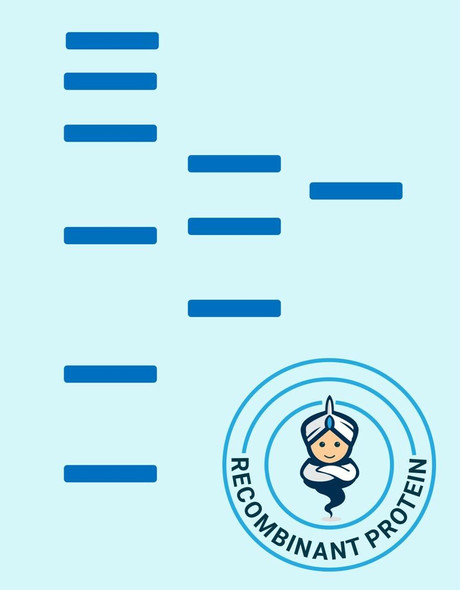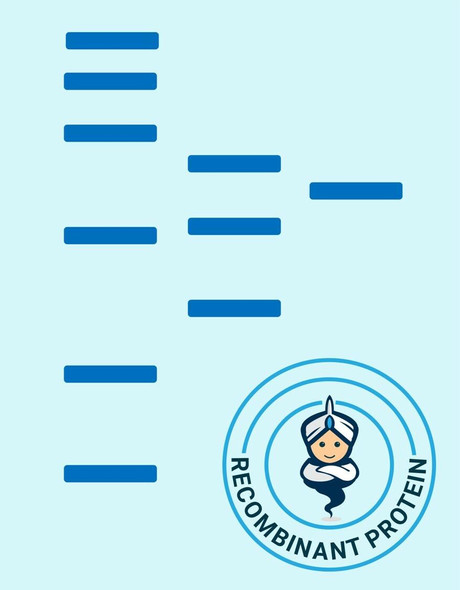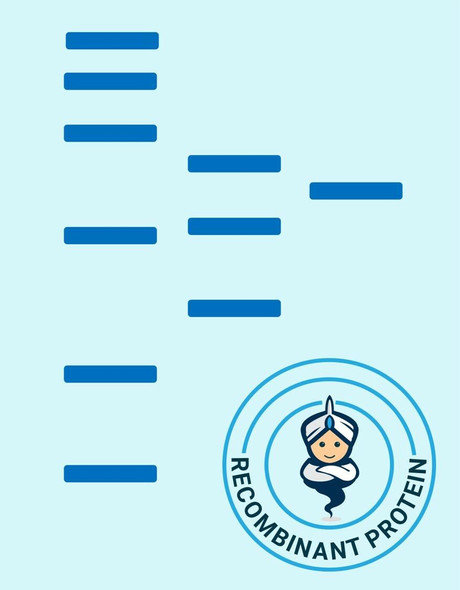Human SERPINI1 Recombinant Protein (RPPB4649)
- SKU:
- RPPB4649
- Product type:
- Recombinant Protein
- Size:
- 10ug
- Species:
- Human
- Target:
- SERPINI1
- Synonyms:
- Neuroserpin
- Peptidase inhibitor 12
- PI-12
- Serpin I1
- Source:
- Escherichia Coli
- Uniprot:
- Q99574
Description
| Product Name: | Human SERPINI1 Recombinant Protein |
| Product Code: | RPPB4649 |
| Size: | 10µg |
| Species: | Human |
| Target: | SERPINI1 |
| Synonyms: | Neuroserpin, Peptidase inhibitor 12, PI-12, Serpin I1, SERPINI1, PI12. |
| Source: | Escherichia Coli |
| Physical Appearance: | Filtered White lyophilized (freeze-dried) powder. |
| Formulation: | Filtered (0.4 µm) and lyophilized from 0.5mg/ml in 0.025M phosphate buffer and 0.035M NaCl, pH 7.4. |
| Solubility: | It is recommended to add 200µl deionized water to prepare a working stock solution of approximately 0.5mg/ml and let the lyophilized pellet dissolve completely. SERPINI1 is not sterile! Please filter the product by an appropriate sterile filter before using it in the cell culture. |
| Stability: | Store lyophilized protein at -20°C. Aliquot the product after reconstitution to avoid repeated freezing/thawing cycles. Reconstituted protein can be stored at 4°C for a limited period of time; it does not show any change after two weeks at 4°C. |
| Purity: | Greater than 95.0% as determined by SDS-PAGE. |
| Amino Acid Sequence: | MKHHHHHHASTGATFPEEAI ADLSVNMYNR LRATGEDENI LFSPLSIALA MGMMELGAQG STQKEIRHSM GYDSLKNGEE FSFLKEFSNM VTAKESQYVM KIANSLFVQN GFHVNEEFLQ MMKKYFNAAV NHVDFSQNVA VANYINKWVE NNTNNLVKDL VSPRDFDAAT YLALINAVYF KGNWKSQFRP ENTRTFSFTK DDESEVQIPM MYQQGEFYYG EFSDGSNEAG GIYQVLEIPY EGDEISMMLV LSRQEVPLAT LEPLVKAQLV EEWANSVKKQ KVEVYLPRFT VEQEIDLKDV LKALGITEIF IKDANLTGLS DNKEIFLSKA IHKSFLEVNE EGSEAAAVSG MIAISRMAVL YPQVIVDHPF FFLIRNRRTG TILFMGRVMH PETMNTSGHD FEEL |
SERPINI1 (Neuroserpin) is an inhibitory serpin which is expressed primarily in the central nervous system. Even though the physiological target of SERPINI1 is still vague, amassed evidence suggest that SERPINI1 has an imperative role in controlling proteolytic degradation of extracellular matrix (ECM) during synaptogenesis and the subsequent development of neuronal plasticity. The neuroprotective role of SERPINI1 has been demonstrated in transgenic mice lacking SERPINI1 expression. The deficiency of SERPINI1 in these mice is linked with motor neuron disease characterized by axonal degradation. In humans, defects in SERPINI1, caused by point mutations in the neuroserpin gene, trigger a hereditary disorder known as the familial encephalopathy with neuroserpin inclusion bodies (FENIB).
SERPINI1 Human Recombinant produced in E.Coli is a single, non-glycosylated, polypeptide chain (a.a 17-410) containing 404 amino acids and including a 10 a.a N-terminal His tag. The total molecular mass is 45.9kDa (calculated).
| UniProt Protein Function: | SERPINI1: Serine protease inhibitor that inhibits plasminogen activators and plasmin but not thrombin. May be involved in the formation or reorganization of synaptic connections as well as for synaptic plasticity in the adult nervous system. May protect neurons from cell damage by tissue-type plasminogen activator. Defects in SERPINI1 are the cause of familial encephalopathy with neuroserpin inclusion bodies (FEN1B). FEN1B is characterized clinically as an autosomal dominantly inherited dementia, histologically by unique neuronal inclusion bodies and biochemically by polymers of neuroserpin. Belongs to the serpin family. |
| UniProt Protein Details: | Protein type:Secreted; Secreted, signal peptide Chromosomal Location of Human Ortholog: 3q26.1 Cellular Component: extracellular space Molecular Function:serine-type endopeptidase inhibitor activity Biological Process: regulation of cell adhesion; central nervous system development; peripheral nervous system development Disease: Encephalopathy, Familial, With Neuroserpin Inclusion Bodies |
| NCBI Summary: | This gene encodes a member of the serpin superfamily of serine proteinase inhibitors. The protein is primarily secreted by axons in the brain, and preferentially reacts with and inhibits tissue-type plasminogen activator. It is thought to play a role in the regulation of axonal growth and the development of synaptic plasticity. Mutations in this gene result in familial encephalopathy with neuroserpin inclusion bodies (FENIB), which is a dominantly inherited form of familial encephalopathy and epilepsy characterized by the accumulation of mutant neuroserpin polymers. Multiple alternatively spliced variants, encoding the same protein, have been identified. [provided by RefSeq, Jul 2008] |
| UniProt Code: | Q99574 |
| NCBI GenInfo Identifier: | 3183087 |
| NCBI Gene ID: | 5274 |
| NCBI Accession: | Q99574.1 |
| UniProt Secondary Accession: | Q99574,Q6AHZ4, A8K217, D3DNP1, |
| UniProt Related Accession: | Q99574 |
| Molecular Weight: | 46,427 Da |
| NCBI Full Name: | Neuroserpin |
| NCBI Synonym Full Names: | serpin peptidase inhibitor, clade I (neuroserpin), member 1 |
| NCBI Official Symbol: | SERPINI1 |
| NCBI Official Synonym Symbols: | PI12; neuroserpin |
| NCBI Protein Information: | neuroserpin; PI-12; serpin I1; peptidase inhibitor 12; serine (or cysteine) proteinase inhibitor, clade I (neuroserpin), member 1 |
| UniProt Protein Name: | Neuroserpin |
| UniProt Synonym Protein Names: | Peptidase inhibitor 12; PI-12; Serpin I1 |
| Protein Family: | Neuroserpin |
| UniProt Gene Name: | SERPINI1 |
| UniProt Entry Name: | NEUS_HUMAN |










